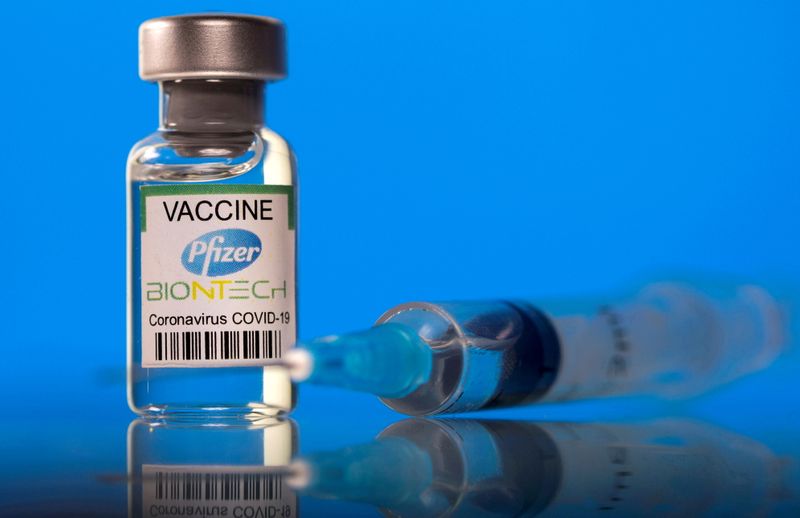Investing.com’s stocks of the week
By Michael Erman
(Reuters) -U.S. Food and Drug Administration scientists said on Wednesday that booster doses of Pfizer (NYSE:PFE)'s COVID-19 vaccine may not be needed, even though the third shot generates a higher immune response in recipients.
The FDA staff members said in a document prepared for outside advisors that it is still unproven that the efficacy of Comirnaty - the COVID-19 vaccine Pfizer developed with Germany's BioNTech SE (NASDAQ:BNTX) - is declining.
"Some observational studies have suggested declining efficacy of Comirnaty over time against symptomatic infection or against the Delta variant, while others have not," they said in the document.
"However, overall, data indicate that currently U.S.-licensed or authorized COVID-19 vaccines still afford protection against severe COVID-19 disease and death in the United States."
The FDA staff did say the booster dose met pre-specified conditions the regulator had set to show that the shot was generating an immune response.
However, they said in the document that licensure for the boosters should also consider ability to prevent hospitalization and death, as well as the dynamics of the pandemic in the United States.
The agency released the document on Wednesday for consideration by a committee of outside experts who will meet on Friday to decided whether to recommend if U.S regulators should approve the extra round of shots.
The FDA staff view reflects that of many scientists who have questioned whether the boosters are necessary broadly, even as President Joe Biden has pushed for the additional shots in the face of surging hospitalizations and deaths caused by the highly contagious Delta variant of the coronavirus.
Biden set a Sept. 20 target to begin administering 100 million booster shots in the United States.
After the FDA meets, a panel of advisors to the U.S. Centers for Disease Control and Prevention is planning to meet next week to make its recommendation, according to White House Press Secretary Jen Psaki.
PFIZER ARGUES BOOSTER APPROVAL
Pfizer, in a document it prepared for the meeting, argued that U.S. regulators should approve a booster shot of its vaccine for use six months after the second dose due to waning effectiveness over time.
Pfizer said data from its own clinical trials showed that the vaccine's efficacy diminished by around 6% every two months after the second dose. It also said the incidence of breakthrough COVID-19 cases in that trial was higher among people who received their shots earlier.
The company also pointed to real world data from Israel and the United States showing declining effectiveness of the Pfizer/BioNTech vaccine.
The U.S drugmaker said in a roughly 300-participant clinical trial, the third dose generated a better immune response than the second. It also pointed to data from the booster program recently started in Israel to show that a third dose restores high levels of protection from the virus.
Earlier this week, two top FDA vaccine scientists were among the authors of an article https://www.reuters.com/world/us/covid-19-vaccine-boosters-not-widely-needed-top-fda-who-scientists-say-2021-09-13 saying they do not believe the current data supports giving the shots. One of those scientists - Marion Gruber, director of the FDA's Office of Vaccines Research and Review - will be speaking at Friday's meeting.
Some U.S. officials are hoping boosters https://www.usnews.com/news/top-news/articles/2021-09-15/analysis-us-looks-to-covid-19-boosters-to-curb-virus-spread might prevent mild cases and reduce transmission of the virus as well as reducing COVID-19 hospitalizations and deaths, which could hasten America's recovery.
Some countries have already begun COVID-19 booster campaigns. The United States authorized extra shots for people with vulnerable immune systems last month.
